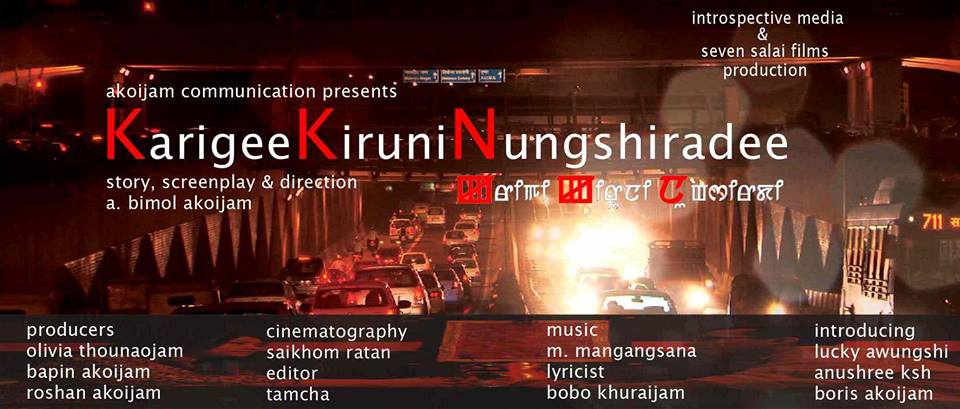Karigee Kirunee Nungsiradee : A Spring Breeze In Manipuri Cinema
Deepika Gurumayum *

Karigee Kirunee Nungsiradee
Lucky, this time! I had wanted to watch the film Karigee Kiruni Nungsiradee (KKN), a production of Introspective Media and Seven Salai Films presented by Akoijam Communications directed by Angomcha Bimol Akoijam, since its premiere in Imphal on 4th January, 2014 but missed out on it like always. So, I decided not to let go off the opportunity this time, which had its Delhi Premiere on 21st March, 2015, on Sajibu Cheiraoba, and it was worth the wait.
As was expected from a versatile academic, Dr.A. Bimol Akoijam, who has not only written and directed the film but also written, composed and sung one of the songs titled "Sandrembi" in the film himself, has given us a film which is hard-hitting and conveys a strong political message.
This is perhaps one of the first Manipuri films to have an actor from the hills in the lead role and we also see the undoing of the stereotypical "Ching-gee Ichal, Tam-gee Ibung" into "Tam-gee Ichal, Ching-gee Ibung". Laced with motifs and Freudian semiotics, half of which I could not understand though, the film offers a gripping experience and it is indeed a new kind of cinema making its way to the Manipuri film circuit, as has been opined by noted filmmaker A.Shyam Sarma on KKN.
I would borrow the words of the filmmaker himself as regards to the plot as it was provided in the synopsis of the film.
"Decades of multilayered conflicts, wherein the violence has become increasingly grotesque, unpredictable and murkier, and shrinking opportunity in Manipur compel many to leave their homestead in search of better education and livelihood elsewhere. Ashang, a young 'tribal' boy from Tangkhul community, and his love, Thoibi, a 'non-tribal' girl from Meitei community are amongst those people. Ashang has just begun working in an MNC in one of the satellite towns of Delhi after submitting his Ph.D. dissertation at JNU, New Delhi, and Thoibi is pursuing her doctoral programme in Chandigarh.
One evening, the story of their troubled 'home' (Manipur) unfolds once again with a bomb blast and shoot out in Imphal. Thoibi arrives unexpectedly in Delhi the same evening and decides to spend the night with Ashang to unwind herself from the sense of despondency that she feels about her native place Manipur. As the events get unfolded that evening, Imo, Thoibi's cousin brother, who is on a 'home' visit to his native state, witnesses the glimpses of the life and times of contemporary Manipur. And amidst the hustle and bustle of the alien metropolitan city and a dream of a life together despite the inter-community estrangement, Ashang and Thoibi are also haunted by the situation in their home state. The next morning, Ashang is woken up by a call from Kanta, his friend at JNU, leaving an eerie prospect that fuses the personal with the political."
Rightly for me as well, the political is brilliantly interspersed with the personal as the minds of the lovers unwind slowly throughout the movie, traversing all aspects of a mundane existence. The dark scenes of suffering Manipur is constantly juxtaposed with the light and independence most of us associate with a metro.
The title "Karigee Kirunee Nungsiradee?" in the beginning draws us more towards the inter-communal relationship of the couple. As the film progresses, we slowly begin to see the interstice through which the political creeps in and by the end, there is a complete turn with the political overshadowing the personal, though there is continuous interplay between the two.
It is also interesting to note that Dr.Akoijam has chosen an epigraph to introduce his film which reads, "Fight or Flight. It's a matter of choice". I see in this a projected reality as well as an irony in that the common perception is "Either stay home, be a part of the place to improve the situation or just escape".
Moreover, the epigraph may also point to the fact that what we see as present day reality is the result of the choices made in the past. Thus, we make that reality which we want to. The choices and decisions we make as a people are crucial to revive the dying land. This seems to be the gist of the film to me.
The use of colloquial language and new generation Meiteilon words in the film (the dialogues) give it a different taste altogether and make it easier for the audience to identify with the contemporary situation. The use of Tangkhul dialect when Ashang speaks to his mother is another authentic aspect of the film.
The film's music and lyrics are extraordinary, coming from masters in their respective fields (the film music is scored by the noted folk musician Mangangsana Mayanglambam and one of the songs in the film sung by well-known Tangkhul singer Rewben Mashangva and a relatively new singer with a sweet and haunting voice, Premlata; lyrics by Senate (Bobo Khuraijam).
It is always a breath of fresh air to see new faces and KKN gave me that rare sense of having unacquainted faces playing out the dilemmas faced by many of us today. And I could so well connect to it! Trained for only a couple of weeks by the director himself, the actors (lead actors, Lucky Awungshi, Anushree Kshetrimayum who were students at Delhi University when the film was shot and journalist Aribam Dhananjoy popularly known as Paojel Chaoba ) are amateurs but did a pretty good job. This I see as another reason for the film being able to drive home the point effectively.
It is impossible to point out a single instance in the plot which I like because there are so many of them, but what touched me very deeply was Thoibi's anguished questioning if it is only the politicians and the insurgents who should think about our homeland.
The same question has been lingering in my mind for quite sometime now and it is overwhelming to realize that it is not just me but there are many more tormented youths who are concerned about our homeland. This question should be addressed and need not remain behind the scenes anymore.
The film also subtly touches on various aspects which ail the state like unemployment, subsequently leading to people going to the metros to seek a better life, frequent water and power cuts, law enforcers indulging in extortion, nepotism, civilians taking law in their hands and many others.
However, we are also shown the hideous facets of life in a metro as is reported in the film by a phone call about a woman from Manipur being misbehaved with by the landlord. Altogether, the film is an eye-opener which seems to suggest that it is high time that we do something to save this beloved land of ours.
By the end of the film, the title also carries with it an additional burden- What stops us from saving our own Home? The director silently seems to reiterate the need to act urgently. There is a constant pricking of the conscience that makes us feel the need to do away with the sense of suffocation and suppression, communalism, daily dose of blasts and shootouts at home which tag along with them the uncertainty of life. Where is our land heading to? Ashang says,"Loirani natte, loirabani". His words are pregnant with the despondency and exhaustion from the dawning realization that the place indeed has become a killing field.
The film is slightly difficult to be understood without pointers, but the intent has been clear and that is what struck me. Such films ought to be more keeping in mind the present situation in Manipur.
Films are a powerful medium to convey social and political messages among the masses and I hope Dr. Akoijam would make this a pioneering instance to lead many more in the future. Kudos to the KKN Team!
